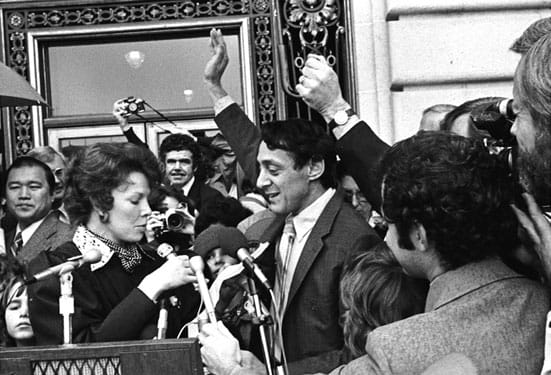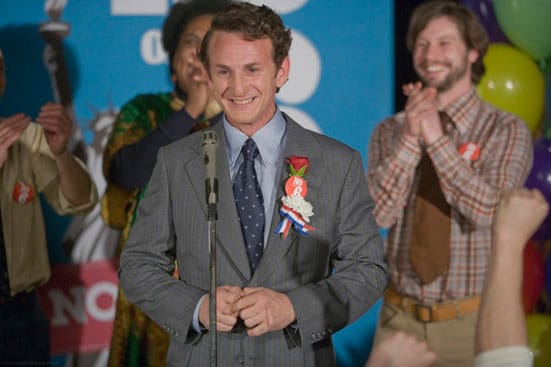The decision to make a biopic of the life of Harvey Milk, the first openly gay politician in the USA, must have been tremendously strategic. 'Milk', directed by Gus Van Sant and starring a prosthetically appended Sean Penn, appears at a time when neo-liberal America is enjoying its finest hour for many years, and whose totem, President Barack Obama, epitomises their apex in so many marvelous and insuperable ways. Culturally, it's a chance for a huge sea change, and 'Milk' indicates the potential for this administration to deliver by proxy a more egalitarian cultural perspective, albeit one that is not yet quite ready to let go of its conventions or its fears.
*
The genre of the Hollywood biopic is prescribed rather than ascribed: the making of one is intensely strategic, motivated by the genre’s assumed ability to be narratively infallible because of its attention to historical accuracy – the attendant 'seriousness' that this engenders critically, and the already proven popularity of their source. Much like the literary genre of biography, the biopic relies on an extant interest in the subject in order to be successful; which is particularly interesting when considering the choice of Harvey Milk as a worthy subject for treatment, and why it’s production is surely indicative of a partial shift in ideology in Hollywood. ‘Milk’ could be termed an emblematic biopic, because Harvey’s worthiness for biographical attention lies elsewhere than himself. His achievements are not primarily personal, and the usual concomitant idiosyncratic behaviour, sexual deviance, violent outbursts or descent into alcoholism are conspicuously absent from his life story. In fact, it is precisely his lucidity, rationality and empathetic fixity that merit his biographical interest, and which in reality appear to have aided him so successfully in his political campaign. It’s a departure from the rather modernist constitution of genius that has pervaded Hollywood mythology for so long: working with the assumption that the grist of a good, cinematic life is secreted in the type of familial or sexual trauma that is so extraordinarily indicative of Freud’s spectral monopoly on constitutions of individual psychology. The film introduces Harvey on his fortieth birthday, when he is persuaded to leave his closeted life for California and the promise of an unrepressed life. There is no recourse to his life before then, and in fact the only piece of historical expose that occurs prior to his appearance is the opening archival footage of gay men being beaten and arrested. In this sense, as Harvey jogs up out of the subway to serendipitously meet his soon-to-be lover Scott Smith, he is emerging from this litany of real victims to emerge into the glorious, technicolored fiction of redemptive Hollywood drama – still clinging to reality through that contextual archive footage, and is grounded in the kind of anonymity and ubiquity that affirms a more sobering truth. Throughout the film, Van Sant refers back to archive footage from the time to remind us of the films sober credentials, and to remind us that Sean Penn isn't Harvey Milk – he does not own this performance. It's a familiar device in biopics and historically committed films that, cynically, is a mock-humble tactic that pays reverent homage to the source whilst invariably conferring nobility on the film for doing so. It's a manipulative and nostalgic move, and somewhat deferential to the assumed sovereignty of reality: in this the cinema protests too much, evangelising it's own worth as an evangelist for truth. The conventional biopic invariably ends up being somewhat staid, conservative, and determined to do justice to its source in the most straightforwardly representational manner possible – and all this while taking extraordinary and absurd liberties. How odd a concession it seems to the real Harvey Milk that Sean Penn, like Nicole Kidman before him, wears a prosthetic nose. Such a theatrical conception of becoming in such an overall context of historical accuracy seems willfully comical. Was Harvey really known for having a particularly large or distorted nose? I suppose it has rather a lot to do with the glare of celebrity meeting such a striving for authenticity. Sean Penn must be in this film – in order to attract crowds, to win an Oscar; to warrant the film even being made – but so must Harvey Milk. It's an impossible paradox solved miraculously with the cunning application of latex.
*
At the end of the film, another slightly mawkish convention rears its head in the form of a series of paragraphs describing what happened next in the real lives of the main protagonists, accompanied by a photo of that real person taken in the period that the film recreates. Again, it’s an all too overt concession to the preeminence of truth in biopic making – these old snapshots do look remarkably similar to their actor counterparts: the same hair, glasses, clothes, body shape etc., but I’m not sure I care. Historical accuracy is one thing – as is each actor’s studious observation and research in to their real-world opposite – but showing us just how miraculous the idea of acting is – how very faithful their representation of reality – by showing us the truth at the end, makes for a truly apologetic denouement, underlining an insecurity that I find verges on cowardice. But it does bring politics overtly into the picture, suddenly situating the audience in the future of the events of the film in a way that makes us complicit in the matter at the heart of the film, perhaps at the expense of the film itself taking a radical stance. Nostalgia like this can be dangerous, with the sense that perhaps the fight for gay rights has been won – that homophobia, along with racism, lies defeated at the feet of the New America. Perhaps by reminding the audience that there exists a significant period of genuine history between the film’s ending and now, we are asked to fill the gap with something other than other films, other roles, other ersatz Hollywood politics.
*
There have been some reviews that decry the film’s apparent utilization of the gay rights issue to promote a renewed political conscience of Hollywood – a marketing strategy that saw a gap in the market around gay rights, and a sure-fire Oscar contender if given over to proven, serious-yet-bankable hands. The truth is, I think, that although these observations must surely hold some nasty truth, the fact that ‘Milk’ is ostensibly a conventional biopic – formulaic, deferential to truth, yet polluted with celebrity economics and power structures – is entirely necessary. Gay rights are certainly underrepresented in Hollywood, and homosexuality in general is more often than not hugely essentialised in mainstream media, via celebrity constitutions of homosexuality as conflated with campness, sexual deviance and innuendo. Harvey Milk is, to some significant extent, not like this. As I mentioned earlier, he is genuinely emblematic rather than peculiar, and in this way defers some of the more problematically hackneyed ‘queer’ characteristics. The formation of queer as unorthodox or perverse – served so desultorily by blanket campness in the mainstream – often seeks representation in alternative cultural products. In this way, gay cinema is usually situated within arthouse rather than blockbuster; chick-flicks rather than action thrillers; Berlin Film Festival rather than the Academy awards. Convention, then, is something understandably avoided by serious homosexual representation because it may become a euphemism for repression. However, this determined heterodoxy inevitably risks the same fate as its would-be oppressors, exerting a dictate, prescribing and categorizing what might be inessential and relative. This is where ‘Milk’ appears to me to be useful. Although it does mark a partial wresting of gay subcultures by Hollywood, it also marks a shift towards a non-hysterical representation of homosexuality by mainstream media. By maintaining an accepted framework for the biopic of Harvey Milk, the film affords its subject difference on another level other than formal – with Harvey and his politics coming to the fore. There are no uncomfortable allowances made for the depiction of homosexual relations, and there is no insistence of difference other than that represented. In this way, the film itself is pretty unremarkable; as a consequence, however, the subject of the film – Harvey Milk, the history and ongoing fight for truly accepted gay rights – is allowed true significance, far in excess of Hollywood and its political contrivances.
Ed Atkins

Harvey Milk

Sean Penn as Harvey Milk